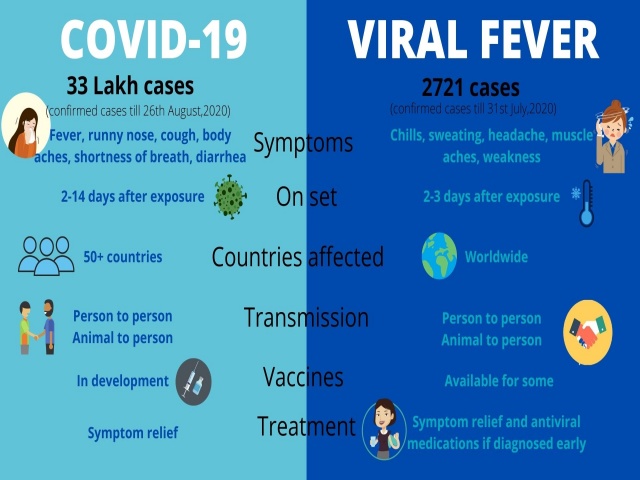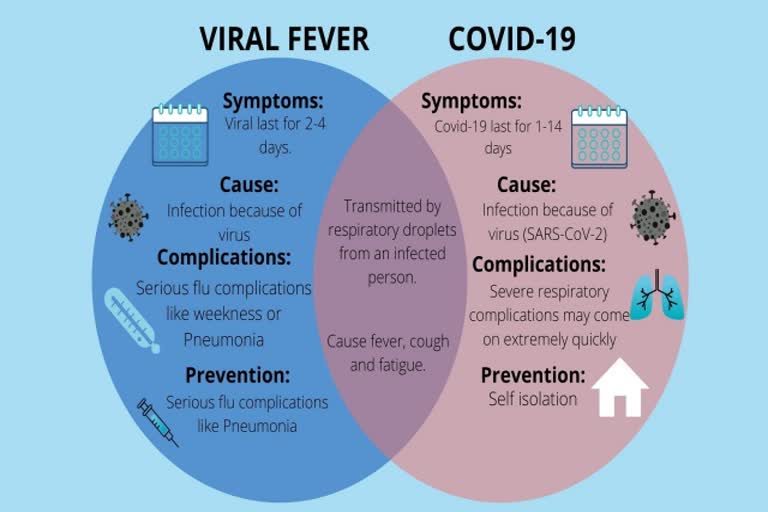The COVID-19 cases have been rising rapidly and along with heavy rainfalls in the current scenario, a sense of terror has hit the people of India. The reason being lots of similarity between COVID-19 and other viral infections, which are also at peak this season. Therefore, here are some similarities and differences as explained by Dr. Sanjay K. Jain, MBBS, MD (Medicine), and the Centers for Disease Control and Prevention (CDC), before you jump to any conclusions on your own.

Symptoms
The symptoms of COVID-19 and other viral infections, which affect the respiratory system have the following ones in common:
- Sore throat
- Cough
- Fever
- Body ache
- Runny nose
Flu: Here, the aforementioned symptoms may vary from mild to severe
COVID-19: It has been known to also show symptoms like loss of taste and smell, which aren’t seen in the case of other viral infections
Rapidity Of Onset
It refers to how fast a person can get infected and become sick. In both cases, the symptoms may be presented within 24 hours or more.
Flu: Symptoms may develop anywhere from 1 to 4 days after infection. Once he/she takes the medication, the flu settles down within 3-5 days, by his/her immunity or medicines. “The whole syndrome is over between 7-10 days,” says Dr. Sanjay.
COVID-19: The virus involved here is very rapid. As per the CDC, the symptoms may be typically seen after 5 days of being infected. However, it may vary from as early as 2 days or as late as 14 days. “Both the onset and severity are higher in the case of COVID-19,” he says.
How Long Can An Infected Person Spread The Virus
According to the CDC, For both COVID-19 and flu, it’s possible to spread the virus for at least 1 day before experiencing any symptoms. The infection is mainly spread through the droplets spread out in the air when a person coughs or sneezes.
Flu: A person can spread the virus until he/she is having a cough, sneezing, and fever. It can remain for about 7 days.
COVID-19: Here, the virus can also spread through touch very quickly. The virus involved in this disease has a tendency to multiply very fast and if a healthy person comes in contact with the surface where the virus is present, he/she may contract the virus. “It is said that the virus can be contagious for upto 14-21 days, which is why the person is quarantined,” says Dr. Sanjay.
Risk And Severity
People at a higher risk include:
- Older adults (People over the age of 60 years)
- People with underlying medical conditions
- People who have recently undergone surgery, like by-pass surgery
- Pregnant ladies
- Nutritionally poor
However, because the COVID-19 virus multiplies very rapidly, these people may get ill very fast as compared to the routine viral infections.
Flu: The severity is not as much as COVID-19, people do not succumb and recovery rate is high
COVID-19: In this, the rate of recovery is poor and can lead to further complications. Also, the death rate is higher in this case.
According to the CDC, both COVID-19 and Flu can result in complications including:
- Pneumonia
- Respiratory failure
- Acute respiratory distress syndrome (i.e. fluid in lungs)
- Sepsis
- Cardiac injury (e.g. heart attacks and stroke)
- Multiple-organ failure (respiratory failure, kidney failure, shock)
- Worsening of chronic medical conditions (involving the lungs, heart, nervous system or diabetes)
- Inflammation of the heart, brain or muscle tissues
- Secondary bacterial infections (i.e. infections that occur in people who have already been infected with flu or COVID-19)
When To Get Tested?
It is important that one does not confuse seasonal flu or other viral infections with COVID-19 infection. In the case of routine flu's, the symptoms like cold or sore throat may settle down within 48 hours of taking the medication. But if there is no improvement seen, and the symptoms rather worsen, the person may be advised to get themselves tested for COVID-19.
Are The Ordinary Viral Infections Being Treated?
Dr. Sanjay informs us that there are facilities available to treat other viral infections as well, even in the current scenario. However, the majority of people prefer tele-consultation over physically visiting hospitals or clinics for the treatment. “But, if a patient comes to seek medical help for any other health conditions than COVID-19, we are treating them.”
Therefore, before you panic about having contracted COVID-19 by confusing it with seasonal flu or other viral infections, you must talk to your physician and get more clarity on it. Also, panicking won’t help and rather leave you with stress and anxiety. Hence, stay calm, and even if you have been tested positive for COVID-19, know that 80% of the people recover from it and there is nothing to worry about.



